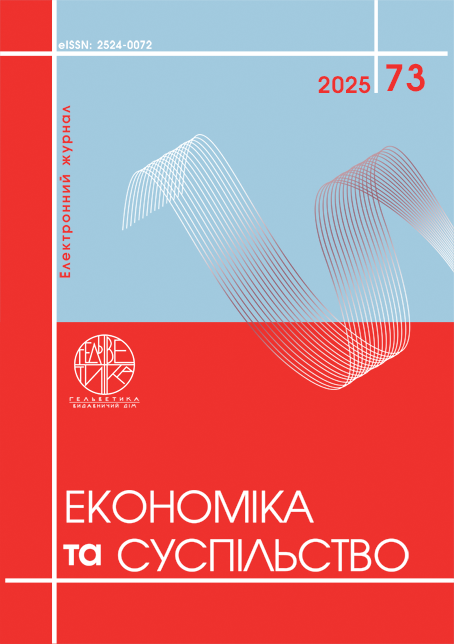ІНСТИТУЦІЙНА ПІДТРИМКА ІННОВАЦІЙНОГО РОЗВИТКУ ПІДПРИЄМНИЦЬКОЇ ДІЯЛЬНОСТІ У ТЕРИТОРІАЛЬНИХ ГРОМАДАХ УКРАЇНИ
Анотація
У статті розглянуто інституційну підтримку інноваційного розвитку підприємницької діяльності в територіальних громадах України. Зосереджено увагу на ролі формальних і неформальних інституцій, що забезпечують нормативну основу, довіру та соціальне підґрунтя для реалізації інноваційних ініціатив. Запропоновано концептуальну модель інституційного середовища, яка охоплює чотири блоки: регуляторний, ресурсний, культурний та інноваційний. Обґрунтовано критерії оцінки прозорості, відкритості й підзвітності в контексті місцевої політики. Проаналізовано індикатори ефективності інституційної інфраструктури та визначено умови формування стійкої бізнес-екосистеми. Акцент зроблено на важливості адаптації міжнародного досвіду, інституційної стабільності та міжсекторальної співпраці для досягнення конкурентоспроможності громад в умовах трансформацій.
Посилання
Бережний, Я. В. Перспективи забезпечення прав власності як підґрунтя для розвитку підприємницької діяльності в Україні. Аналітична записка. Національний інститут стратегічних досліджень. URL: http://www.niss.gov.ua/articles/1659
Гайдай, Т. В. (2006). Інституція як інструмент інституційного економічного аналізу. Економічна теорія, (2), 53–64.
Гриценко, О. А. (2014). Неформальні інститути впливу на владу в контексті економічного аналізу. Вісник Національного університету «Юридична академія України імені Ярослава Мудрого». Серія: Економічна теорія та право, (2), 17–25.
Дзюбик, С., & Ривак, О. (1994). Основи економічної теорії. Київ: Основи. 342 с.
Линдюк, А. М. (2024). Методологічні підходи до оцінки ефективності підприємницької діяльності в територіальних громадах. Економіка та суспільство, (69). URL: https://doi.org/10.32782/2524-0072/2024-69-133
Лисюк, В. С. (2022). Формування якісно нового інституційного середовища в Україні. Науковий вісник Ужгородського університету. Серія «Економіка», (2(60)), 45–51.
Ложачевська, О. М., & Гречан, П. Ю. (2020). Інноваційна активність підприємства: аналіз існуючих підходів і методів оцінки. Економіка та держава, (8), 53–55. URL: https://doi.org/10.32702/2306-6806.2020.8.53
Михайлюк, І. М. (2010). Інституційні чинники інноваційного розвитку вітчизняних підприємств. Науковий вісник Чернівецького університету, (495), 82–86.
Норт, Д. (2000). Інституції, інституційна зміна та функціонування економіки світу / пер. з англ. І. Дзюба. Київ: Основи. 198 с.
Стрижак, О. О. (2016). Дихотомія формальних та неформальних інститутів. Економіка і суспільство, (5), 20–25.
Яців, І. Б. (2022). Неформальні інституції як чинник розвитку підприємництва. Організаційно-економічні та соціальні складові розвитку підприємництва: збірник матеріалів Всеукраїнської науково-практичної конференції (Львів, ЛНУП, до 165-річчя університету та 70-річчя економічного факультету). Львів: ЛНУП. 369 с.
Vaskivska, K., Lyndyuk, A., Danyliuk, O., Kucher, A., & Vaskivskyy, Y. (2023). Management of business activity of territorial communities: case of Ukraine. Journal of Environmental Management and Tourism, 14(3), 657–669. URL: https://doi.org/10.1504/IJGENVI.2021.121010
Berezhnyi, Ya. V. (n.d.). Perspektyvy zabezpechennia prav vlasnosti yak pidgruntia dlia rozvytku pidpryiemnytskoi diialnosti v Ukraini [Prospects for ensuring property rights as a basis for the development of entrepreneurial activity in Ukraine]. Analitychna zapyska. Natsionalnyi instytut stratehichnykh doslidzhen. Available at: http://www.niss.gov.ua/articles/1659 (accessed April 12, 2025). (in Ukrainian)
Gaidai, T. V. (2006). Instytutsiia yak instrument instytutsiinoho ekonomichnoho analizu [Institution as a tool of institutional economic analysis]. Ekonomichna teoriia – Economic Theory, (2), pp. 53–64. (in Ukrainian)
Hrytsenko, O. A. (2014). Neformalni instytuty vplyvu na vladu v konteksti ekonomichnoho analizu [Informal institutions of influence on power in the context of economic analysis]. Visnyk Natsionalnoho universytetu "Yurydychna akademiia Ukrainy imeni Yaroslava Mudroho". Seriia: Ekonomichna teoriia ta pravo – Bulletin of the National University "Yaroslav the Wise Law Academy of Ukraine". Series: Economic Theory and Law, (2), pp. 17–25. (in Ukrainian)
Dziubyk, S., & Ryvak, O. (1994). Osnovy ekonomichnoi teorii [Fundamentals of economic theory]. Kyiv: Osnovy. (in Ukrainian)
Lyndiuk, A. O. (2024). Metodolohichni pidkhody do otsinky efektyvnosti pidpryiemnytskoi diialnosti v terytorialnykh hromadakh [Methodological approaches to assessing the effectiveness of entrepreneurial activity in territorial communities]. Ekonomika ta suspilstvo – Economy and Society, (69). Available at: https://doi.org/10.32782/2524-0072/2024-69-133 (in Ukrainian)
Lysiuk, V. S. (2022). Formuvannia yakisno novoho instytutsiinoho seredovyshcha v Ukraini [Formation of a qualitatively new institutional environment in Ukraine]. Naukovyi visnyk Uzhhorodskoho universytetu. Seriia: Ekonomika – Scientific Bulletin of Uzhhorod University. Series: Economics, 2(60), pp. 45–51. (in Ukrainian)
Lozhachevska, O. M., & Hrechan, P. Yu. (2020). Innovatsiina aktyvnist pidpryiemstva: analiz isnuiuchykh pidkhodiv i metodiv otsinky [Innovation activity of the enterprise: analysis of existing approaches and evaluation methods]. Ekonomika ta derzhava – Economy and State, (8), pp. 53–55. Available at: https://doi.org/10.32702/2306-6806.2020.8.53 (in Ukrainian)
Mykhailiuk, I. M. (2010). Instytutsiini chynnyky innovatsiinoho rozvytku vitchyznianykh pidpryiemstv [Institutional factors of innovative development of domestic enterprises]. Naukovyi visnyk Chernivetskoho universytetu – Scientific Bulletin of Chernivtsi University, (495), pp. 82–86. (in Ukrainian)
North, D. (2000). Instytutsii, instytutsiina zmina ta funktsionuvannia ekonomiky svitu [Institutions, institutional change, and economic performance] / transl. I. Dziuba. Kyiv: Osnovy. (in Ukrainian)
Stryzhak, O. O. (2016). Dykhotomiia formalnykh ta neformalnykh instytutiv [Dichotomy of formal and informal institutions]. Ekonomika i suspilstvo – Economy and Society, (5), pp. 20–25. (in Ukrainian)
Yatsiv, I. B. (2022). Neformalni instytutsii yak chynnyk rozvytku pidpryiemnytstva [Informal institutions as a factor in the development of entrepreneurship]. Orhanizatsiino-ekonomichni ta sotsialni skladovi rozvytku pidpryiemnytstva: Zbirnyk materialiv Vseukrainskoi naukovo-praktychnoi konferentsii (Lviv, LNUP). Lviv: LNUP. (in Ukrainian)
Vaskivska, K., Lyndiuk, A., Danyliuk, O., Kucher, A., & Vaskivskyy, Y. (2023). Management of business activity of territorial communities: case of Ukraine. Journal of Environmental Management and Tourism, 14(3), pp. 657–669. Available at: https://doi.org/10.1504/IJGENVI.2021.121010 (in English)


